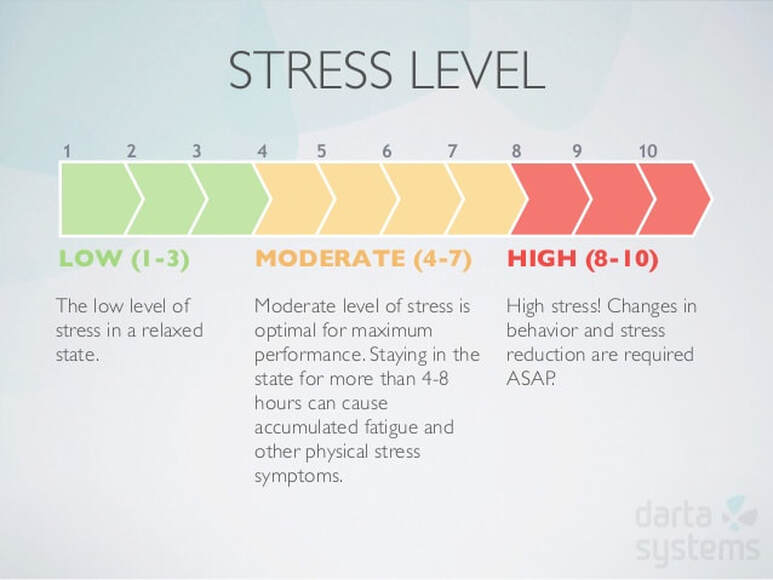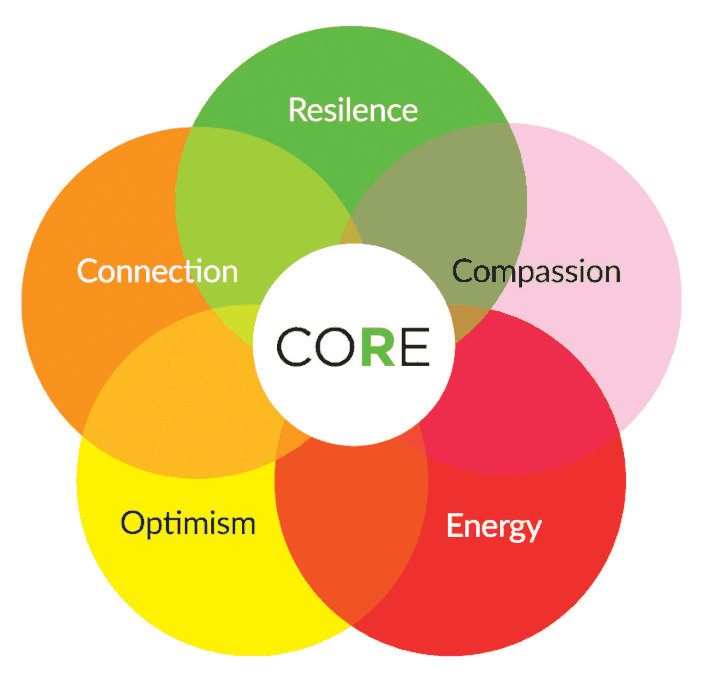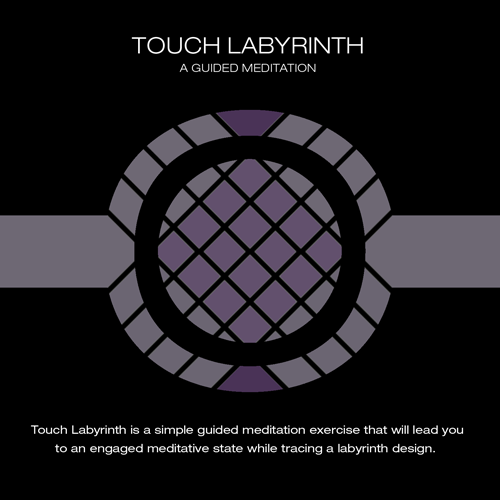 Takeaways: • Self-assessment techniques can be as effective as clinical measures for stress • Regular stress awareness can lead to better physical and mental health • Developing stress coping skills is crucial for managing stress effectively Most online stress measurement tools use a "life-event" method to determine your stress levels. They consider major events like divorce, job loss, or illness as indicators of high stress. However, this approach doesn't account for daily activities and how we react to them. Smaller but significant stressors, like a difficult boss or challenging relationships, can build up over time. A better way to assess stress is similar to how we measure exercise intensity. The Rating of Perceived Exertion (RPE) scale lets you estimate how hard you're working out without special equipment. You rate your effort from 6 (no exertion) to 20 (very intense). This method is often as accurate as using heart rate monitors. Dr. Sheldon Cohen of Carnegie Mellon University developed a similar technique for stress called the Perceived Stress Scale (PSS). It asks you to estimate your stress based on uncertainty, lack of control, and overload in various areas of your life. You can find online tests based on this method to self-assess your stress levels. I prefer a printed version of this test. It takes just a few minutes to complete the list. https://www.das.nh.gov/wellness/Docs%5CPercieved%20Stress%20Scale.pdf (If this link does not work – use keyword Cohen PSS in your favorite search engine) I like the online tool for Cohen PSS - by Kresser Institute because it does not require you to provide an email address. You can share your email if you want a copy of the test. I just use the copy and paste option. kresserinstitute.com/tools/pss/ The importance of stress awareness cannot be overstated. Research has shown that individuals with higher perceived stress, as measured by the PSS, often face more significant health challenges. For example, higher PSS scores have been associated with:
These findings highlight why monitoring your stress levels is crucial for maintaining good health. By recognizing our stress levels, we can take steps to reduce them and potentially avoid these negative health outcomes. To effectively manage stress, it's important to develop coping skills. There are two broad ways to deal with stress - directly and indirectly. Direct stress-coping skills address the underlying cause of stress, such as time management, organization, assertiveness, and asking for help. Indirect stress-coping skills help you feel better despite your stress, like regular exercise, spending time in nature, engaging in social activities, and taking time to relax every day. Building these stress management skills takes effort and time. A lot of stress management has to do with fundamental life habits - sleep, diet, and exercise, as well as engaging in your community and taking time to do the things you enjoy. Action Steps:
By focusing on stress awareness and developing effective coping strategies, we can take control of our mental and physical health. Remember, understanding your stress is the first step towards managing it effectively. We'd love to hear about your own methods for assessing and managing stress levels! If you're interested in one-on-one coaching (remote or face-to-face) on using your smartwatch to monitor stress levels or developing personalized stress management strategies, please reach out using the registration form on our workshop page. Your experiences and insights can help you and others on their journey to better stress management and overall well-being. Please remember these tests and screenings are not a substitute for a clinical evaluation. Contact a health professional for more information and a complete exam.
0 Comments
 "Nothing will ever be attempted if all possible objections must first be overcome." - Samuel Johnson One of my friends sent me this lovely quote. It reminded me of the many risks and obstacles we face in life. We often are paralyzed to take the actions to make our lives more fulfilling, energized and joyful. Many of us are scared about the future and the word “change”. If we want to reduce the impact of negative stress in our lives, we have to be aware of how much we tend to take things personally that actually are not personal. We rush through life, meeting deadlines and missing out the fun aspects of our life, our loving relationships and the beauty around us. We literally shape our brain to run in this treadmill of more stress, anxiety and unhappiness. Our brain is plastic – that means both the function and its structure can be changed quickly and permanently to become positive and joyful. Even a simple act of spending a few minutes with our loved ones, indulging in our favorite art activity or thinking of our last vacation has the ability to energize and relax us. We often wallow in self-pity and self-doubt and don’t fully realize our strengths and our inner resilient nature - having the capacity to bounce back when things go wrong, and ability to enjoy life even when we have pain, stress and challenges. Science has shown us that these practices can shape our brain and enhance our well-being. Make time for these three important activities on a daily and weekly basis. These practices are as important as healthy eating and hydration in managing stress and building your resilience over time!
Combine these activities. Go to a meditation or yoga class with your best friend. Walking meditation in a local garden or labyrinth may be a beautiful break from your daily stress. Help out with a local 5k race. Most important – don’t just read this article. Share it with a friend or family member and spend time with them! Take Action! Now! My friend Vicki created the beautiful CORE graphic for us! The acronym CORE serves as a reminder of the components of Resilience: C – 5 Cs - Compassion, Courage, Collaboration, Creativity and Critical Thinking O – Optimism and Hope R – Resilience E - Energy - healthy eating, meditation and physical activity References R J Davidson, B S McEwen, Social influences on neuroplasticity: Stress and interventions to promote well-being Nat Neurosci. Apr 15, 2012; 15(5): 689–695.doi: 10.1038/nn.3093 Steve Paulson, Richard Davidson, Amishi Jha and Jon Kabat-Zinn Becoming conscious: the science of mindfulness, doi: 10.1111/nyas.12203 Ann. N.Y. Acad. Sci. 1303 (2013) 87–104 You often see reports about stress "causing" heart disease in the popular media. There are two separate issues - heart attack versus heart disease. Heart disease occurs over a period of time - heart attack is a specific event - often the last stage of heart disease as a person succumbs to this disease.
What is a heart attack? A heart attack is a very specific event! A heart attack occurs when the blood supply to part of the heart muscle itself is severely reduced or stopped. The reduction or stoppage happens when one or more of the coronary arteries supplying blood to the heart muscle is blocked. This is usually caused by the buildup of plaque (deposits of fat-like substances), a process called atherosclerosis. The plaque can eventually burst, tear or rupture, creating a "snag" where a blood clot forms and blocks the artery. This leads to a heart attack. If the blood supply is cut off for more than a few minutes, muscle cells suffer permanent injury and die. This can kill or disable someone, depending on how much heart muscle is damaged. The medical term for heart attack is myocardial infarction. A heart attack is also sometimes called a coronary thrombosis or coronary occlusion. What is Heart Disease? Heart disease refers to conditions in your arteries and other blood vessels related to your heart. Coronary Artery Disease (CAD) refers to the build of plaque in your arteries (see atherosclerosis above). In some individuals this "process" starts as early as 2 years of age. CAD can result in angina (chest pain) or heart attack or other health complications. Several factors play an important role in heart disease including your family history, cholesterol levels, level of physical activity and smoking. Many studies suggest that anger and negative handling of stress can have a powerful effect on a person's immunity and risk of heart disease. People who hate their jobs have double the risk of dying from heart disease as compared to people who enjoy their jobs. It must be understood that the "garden variety" of stress is common for most people. It is not the "stress" that kills but how we handle it. The bottom line - if you have anger issues or you have "unhealthy" ways of dealing with your stress levels - consider meditation and other relaxation methods. 03-18-2010 Original Publication 05-03-2014 Links updated The media loves to publicize the dangers of excess stress in promoting negative behaviors and decreasing our immune system. We all know about sleepless nights when we worry about our jobs, relationships and problems. We know how excess stress seems to manifest in physical pain and inability to enjoy simple pleasures.
Ancient wisdom and recent scientific studies show that it is our perception of our stress that may be to blame. In fact, stress is part of our evolution and it has many benefits including help us with focus and provide us with spurts of energy! Stress can actually lead to a longer life – as long as you look at it as a positive! A recent study at UW Madison surveyed about 30,000 persons to rate their level of stress over the past year as well as how much they believed this stress influenced their health — a little, a moderate amount or a lot. Public death records were examined to track these persons over a period of 8 years. People who reported having high levels of stress AND who believed stress had a large impact on their health had a 43% increased risk of death compared to people who experienced a lot of stress BUT did not perceive stress to be negative. In fact, the persons who did not perceive stress to be negative had a lower chance of dying even compared to the people who considered their stress levels to be low! Consider the three "Gifts" of Stress: Focus: In stressful situations, our heart beats faster, our breath quickens and we may start sweating too. Stress focuses our attention on the problem at hand, increases our energy levels and motivates us to deal with the situation. Connection: We are often driven to get support and help from our friends and family during periods of stress. We also want to protect, love and support our loved ones during their tough times. Growth: Emotional responses to stress often make us review the stressful conditions. We learn and try to change or act in different ways. It does not mean that you throw yourself in long and stressful conditions at work but be aware of stress in your life. Act on your strong emotions (Not react). See if you can find the "gifts" from the challenges you are facing. Let us assume that you work with a tough boss and you feel very stressed during your meetings with him or her. It is possible to train your mind to thrive in that stress. Here are four mini-steps on behavior awareness and change that can transform your life! Step 1 – Focus objectively on the situation: Pay attention to how stress manifests itself. How does the stressful meeting with the boss cascade into your daily activities. Do you pass on the stress to co-workers, your family, your friends? Writing a journal or talking about it with your spouse or best friend is great first step . . . but do not stop there. Step 2 – Trigger Your Relaxation Connect this awareness practice with an activity just before meetings with your boss. As you head out to your meeting, take a few minutes to view the photos of your loved ones. Touching a little Buddha statue or tracing your kid’s drawing is another nice trigger to remind me to be aware of your reactions to stress. Step 3 –Get Ready - Write a little blessing for yourself (“May I be happy and peaceful”) or any other phrase to center yourself. See this blog article for more information on similar phrases and how to use them. http://meditation-magic.com/key-to-happiness-cultivate-our-capacity-for-kindness/ Step 4 – Act and Adapt- As the meeting starts, you may be surprised that your stress levels do not build up as quickly as before. When they do come, you will aware of them. Resolve to see how your body reacts to stress and how it benefits you in small doses. Does your stress help you to focus better? Do you get a burst of nervous energy? Talk to yourself. Accept stress is part of millions of years of evolution and it is designed to guide and protect you. As you continue this practice of “stress-awareness”, you will be amazed to see stress in a new light. You will welcome it as an “old” friend and leverage the sense of urgency when you need it. Find opportunities to learn and grow! You will also learn to dissipate your anxiety and stress when it is not needed. Download: Free Download 10 min Guided Meditation: Three Gifts of Stress by Dr K (Background Music: Insight Meditation by J.S. Epperson https://higher-music.bandcamp.com/album/insight, used with permission) Do not use this meditation while driving or when your complete attention is needed for a task at hand. References |
a guided finger meditationEngage your senses with soothing music, guided imagery and a labyrinth tracing activity which leverages the power of touch. Click the album cover to learn more. Categories
All
|

 RSS Feed
RSS Feed